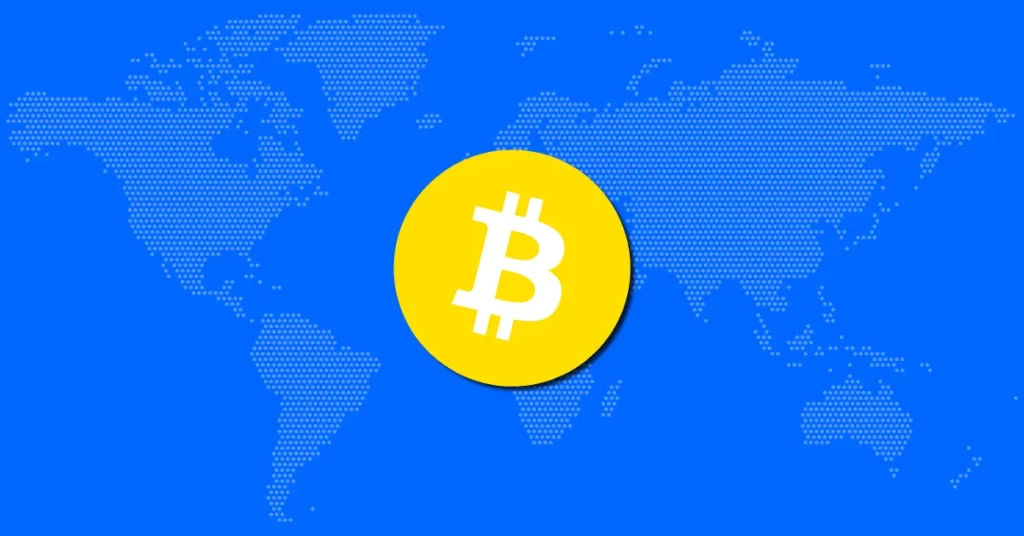The post Bitcoin 101: Everything You Need to Know About the Future of Money appeared first on Coinpedia Fintech News
Consider this!
You walk into a coffee shop in 2030. You tap your phone, and just like that, you’ve paid for your cappuccino. But wait, you didn’t use your credit card or cash. You paid with Bitcoin. We know that it sounds a lot like a scifi movie.
Well, the future might be closer than you think. Let’s talk about Bitcoin– what it is, how it works, and why everyone’s buzzing about it.
What Is Bitcoin?
Okay, let’s start simple. Bitcoin is digital money.
So, unlike the cash in your wallet, you can’t touch or see it. But it works just like regular money. You can buy things, pay for services, or even send it to someone halfway across the world. The difference?
Bitcoin is decentralized. No government or bank controls it.
Now, that’s a big deal. Why?
Because most of the money we use today is controlled by banks and governments. They decide how much money to print, set interest rates, and manage transactions. Bitcoin flips this system. It’s run by people like you and me through a technology called blockchain.
Don’t worry, we’ll get to that in a bit.
How Did Bitcoin Start?
Bitcoin was created in 2009 by a person (or group) named Satoshi Nakamoto. Till today, no one knows who they really are. Satoshi wanted to create a system where people could transfer money directly without needing a middleman like a bank.
Why was this needed?
Well, think about the 2008 financial crisis. Banks failed, people lost savings, and trust in the financial system took a big hit. Bitcoin was designed to solve this problem. It’s a system where trust isn’t placed in a person or an institution. Instead, it’s placed in technology.
How Does Bitcoin Work?
Here’s where things get interesting.
Bitcoin uses blockchain technology. Blockchain is like a digital ledger. Every Bitcoin transaction is recorded on this ledger. But instead of one person controlling it, everyone who uses Bitcoin has a copy of it.
Now, let’s say you send Bitcoin to your friend.
That transaction gets added to the blockchain. Before it’s added, though, it needs to be verified. This is done by computers called miners. They solve complex puzzles to confirm the transaction.
Once verified, the transaction is locked in the blockchain forever. No one can change or delete it. This makes Bitcoin super secure.
Why Is Bitcoin So Popular?
There are a few reasons people love Bitcoin:
- It’s Decentralized: No single authority controls Bitcoin. This makes it immune to government interference or manipulation.
- It’s Transparent: Every transaction is recorded on the blockchain. Anyone can view it, but your identity stays private.
- Limited Supply: Only 21 million Bitcoins will ever exist. This scarcity makes it valuable, like gold.
- It’s Fast and Global: You can send Bitcoin to someone in another country in minutes. No banks, no delays.
- It’s the Future: Many believe Bitcoin will replace traditional money. Big companies like Tesla and PayPal already accept it.
And, Is Bitcoin Safe?
Now, I know what you’re thinking. If Bitcoin is digital, can’t it be hacked? The answer is both yes and no.
Bitcoin itself is very secure. The blockchain technology behind it is nearly impossible to hack. But, how you store your Bitcoin matters. If you keep it in an online wallet and someone gets your password, they can steal your coins. That’s why many people use hardware wallets – physical devices that store your Bitcoin offline.
What Can You Do With Bitcoin?
When Bitcoin first started, you couldn’t do much with it. But today, the list of uses is growing:
- Shopping: Companies like Microsoft, Overstock, and AT&T accept Bitcoin.
- Investing: Many people buy Bitcoin as an investment, hoping its value will grow.
- Sending Money: It’s great for sending money to friends or family overseas. No need to pay high fees to banks or services like Western Union.
- Charity: Some organizations accept Bitcoin donations.
- Travel: Websites like Expedia let you book flights and hotels with Bitcoin.
Why Do Bitcoin Prices Go Up and Down?
If you’ve heard about Bitcoin, you’ve probably also heard about its crazy price swings. One day it’s worth $20,000; the next, it drops to $15,000. Why does this happen?
Bitcoin’s price is driven by supply and demand. When more people want to buy Bitcoin, the price goes up. When they sell, it goes down. News also plays a big role. If a country bans Bitcoin, the price usually drops. If a big company starts accepting it, the price often rises.
Should You Invest in Bitcoin?
Great question. Bitcoin has made many people rich. But it’s also very risky. Its price can go up or down a lot in a short time. Before investing, ask yourself:
- Can I handle losing the money I invest?
- Do I understand how Bitcoin works?
- Am I okay with long-term risks?
If you’re new to investing, start small. Learn about Bitcoin first. And never invest more than you can afford to lose.
Bitcoin vs. Other Cryptocurrencies
Bitcoin was the first cryptocurrency, but it’s not the only one. Today, there are thousands of cryptocurrencies, like Ethereum, Ripple, and Litecoin. Each has its own purpose.
For example, Ethereum is great for building apps, while Ripple is designed for fast bank transfers.
But Bitcoin is still the king. It’s the most popular and valuable cryptocurrency. Most people see it as digital gold.
The Challenges Bitcoin Faces
While Bitcoin has a lot of potential, it’s not perfect. Here are some challenges:
- Scalability: Bitcoin’s network can handle only a limited number of transactions at a time. This leads to delays and high fees when the network is busy.
- Energy Use: Mining Bitcoin uses a lot of electricity. Critics say it’s bad for the environment.
- Regulation: Some governments don’t like Bitcoin. They’ve banned or heavily regulated it.
- Volatility: Its price swings make it unreliable for everyday use.
The Future of Bitcoin
So, what does the future hold? No one knows for sure, but here are some possibilities:
- Wider Adoption: More companies and people might start using Bitcoin.
- Better Technology: Upgrades could make Bitcoin faster and more efficient.
- Government-Backed Cryptos: Some countries are creating their own digital currencies. This could compete with Bitcoin.
- Higher Prices: Some experts believe Bitcoin’s price will keep rising as its supply becomes scarcer.
Bitcoin isn’t just money. It’s more like a revolution. It challenges the way we think about finance, trust, and value. Whether you decide to use it, invest in it, or just learn about it, one thing is clear –
Bitcoin is here to stay.
So, the next time you hear someone talking about Bitcoin, you won’t feel left out. In fact, you might even have a few things to share. And who knows? Maybe one day, you’ll be buying your coffee with Bitcoin too.
FAQs
Bitcoin is digital money powered by blockchain technology, allowing peer-to-peer transactions without government or bank control.
Bitcoin is decentralized, transparent, scarce, fast, and global, making it a revolutionary digital currency that many believe will replace traditional money.
Bitcoin’s blockchain is secure, but how you store it matters. Use offline hardware wallets for extra security against hacks.
Bitcoin’s price is driven by supply and demand, news, and market sentiment, causing frequent price swings.
Bitcoin can be risky due to its price volatility. Start small, do your research, and only invest what you can afford to lose.


